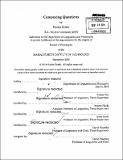| dc.contributor.advisor | Danny Fox, Martin Hackl, Irene Heim and David Pesetsky. | en_US |
| dc.contributor.author | Kotek, Hadas | en_US |
| dc.contributor.other | Massachusetts Institute of Technology. Department of Linguistics and Philosophy. | en_US |
| dc.date.accessioned | 2015-02-05T18:27:56Z | |
| dc.date.available | 2015-02-05T18:27:56Z | |
| dc.date.copyright | 2014 | en_US |
| dc.date.issued | 2014 | en_US |
| dc.identifier.uri | http://hdl.handle.net/1721.1/93840 | |
| dc.description | Thesis: Ph. D. in Linguistics, Massachusetts Institute of Technology, Department of Linguistics and Philosophy, 2014. | en_US |
| dc.description | Cataloged from PDF version of thesis. | en_US |
| dc.description | Includes bibliographical references (pages 257-273). | en_US |
| dc.description.abstract | This dissertation motivates a new syntax and semantics for simplex and multiple wh-questions, concentrating on English and German data. The proposed theory combines Cable's (2007; 2010) Q-based syntax for wh-movement and pied-piping with a new and simple semantics that combines ingredients familiar from the literature in a novel way. I model the pair-list reading of the question as denoting a family of questions (Roberts, 1996; Hagstrom, 1998; Krifka, 2001; Buring, 2003; Fox, 2012; Nicolae, 2013, a.o.), and derive the pair-list and single-pair readings of the question from minimally different LFs. This theory naturally fits with existing analyses of the presuppositions of questions and with Beck's (2006) theory of focus intervention effects. The proposed syntax-semantics leads to a new descriptive generalization for focus intervention effects. I present novel data that the previously assumed strict correlation between intervention and superiority in English (Pesetsky, 2000) is incorrect. Instead, intervention occurs whenever the relation between a wh-word and its associated Q-particle is disrupted at LF. This happens in superiority-violating questions, inside overt and covert pied-piping constituents, and in superiority-obeying questions whenever covert wh-movement is restricted to a position below an intervener. Furthermore, intervention can be avoided in superiority-violating questions if the in-situ wh is given wide scope above an intervener through non-interrogative movement. Finally, I present arguments from offline judgments as well as from online sentence processing that in-situ wh-phrases in English superiority-obeying questions undergo covert movement, but in-situ wh-phrases in superiority-violating questions are truly in-situ at LF. I furthermore argue that the covert movement step of the in-situ wh should be modeled as covert scrambling instead of the unbounded movement to the interrogative complementizer that is traditionally assumed. Movement targets the first position where a wh is interpretable, and is only extended in extraordinary cases, for example in order to avoid a structure that would be an intervention effect, or in order to allow for ellipsis resolution. This makes the behavior of English parallel to that of German. I argue that this is advantageous for the acquisition of questions and intervention, and helps to account for our understanding of the cross-linguistic typology of multiple questions. | en_US |
| dc.description.statementofresponsibility | by Hadas Kotek. | en_US |
| dc.format.extent | 273 pages | en_US |
| dc.language.iso | eng | en_US |
| dc.publisher | Massachusetts Institute of Technology | en_US |
| dc.rights | M.I.T. theses are protected by copyright. They may be viewed from this source for any purpose, but reproduction or distribution in any format is prohibited without written permission. See provided URL for inquiries about permission. | en_US |
| dc.rights.uri | http://dspace.mit.edu/handle/1721.1/7582 | en_US |
| dc.subject | Linguistics and Philosophy. | en_US |
| dc.title | Composing questions | en_US |
| dc.type | Thesis | en_US |
| dc.description.degree | Ph. D. in Linguistics | en_US |
| dc.contributor.department | Massachusetts Institute of Technology. Department of Linguistics and Philosophy | |
| dc.identifier.oclc | 900967061 | en_US |
